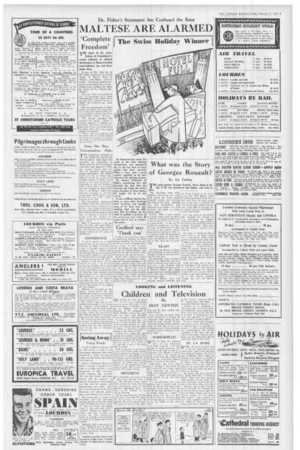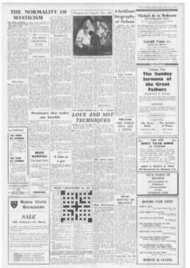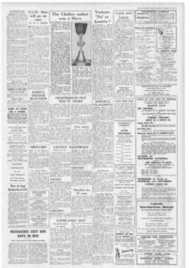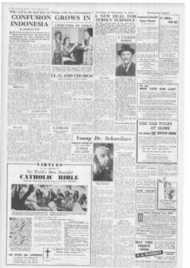Page 5, 21st February 1958
Page 5

Report an error
Noticed an error on this page?If you've noticed an error in this article please click here to report it.
Tags
Share
Related articles
The People And Religion
Looking And Listening Tv In The Schoolroom
LOOKING and LISTENING
Children and Television
By JOAN NEWTON
TVI think the time has come for me to say a considered word or two on the subject of the harmful effects of television viewing on children, with special reference to the paragraph in Molly Walsh's column last week and the letter from Dorothy Cleary on page 2 of the same issue.
To begin at the beginning — is it not a false premise that television is such a menace? Is it any more of a menace than the radio, or comics, or even noisy children playing in the street outside?
I think it is about time that parents and teachers realised that television is here to stay, and that its power to attract will increase as the years go by. It is useless to try and shut it out of the house and the school.
With intelligence it can become a very useful asset in the training and amusing of our young. It is a power only we can control in our own homes, and it is hardly fair on television producers to blame them because we cannot take enough interest in the programmes ourselves to judge what is and is not suitable for young viewers.
DIFFERENT
IT is impossible, of course. to lay
down hard and fast rules. I. too, like Dorothy Cleary, have seven children but have. from my own observations, come to very different conclusions about the effects of this "menace" on my varying offspring.
She has found that her 7-10 agegroup suffer most from TV watching. In my family it is just the opposite. My sevenand nine-yearolds ignore it and it is the tinder fives and the elder children who watch it most.
It is a terrible distraction when there is homework to be done. If a separate room cannot be provided for study, then the TV just has to be switched off for a definite length of time. But to cut it out all together, as Fr. Bernard Rickett suggested lately, is carrying it a hit far. I think.
HARD-BOILED
wITII TV plays the situation must, too, vary immensely from home to home. I am sure parents of nearly grown-up children will agree with me that it is sometimes very difficult to know when a child is old enough to listen to the more adult plays and to know, too. when such a play is likely to arrive on the screen.
Both B.B.C. and I.T.A. often give a warning if they think the play unsuitable, but I have found from experience that what they think won't do turns out to be perhaps — mildly horrifying and quite suitable for my own hardboiled lot.
It is the adolescent who is the problem and I myself prefer to keep the play on and answer any questions, rather than switch the set off and have the family sitting in baffled silence as a result. have found. too, that the elder children dislike an unsavoury play very much and ask to switch it otf or to "see what's on the other side." LAST Sunday's Television World Theatre play "The Judge" — translated from the Danish of H. C. Branner by A. I. Roughton — was such a one. The three grownup children of a dying judge meet, after many years, to be with him at the end. A revolting trio they Were, too, especially the youngest son, played by Denholm Elliott.
1.1e was a waster and a braggart and bad the most ridiculous lines to declaim that it is possible to imagine. I cannot decide whether the unpleasantness and general corniness of this play were the fault of the author, actors, or producer, but the whole affair left an unpleasant taste in the mouth.
DE LA MARE RADIO. As usual. the best is left to the last when there is not much more room. I must say first how much we enjoyed last Thursday's Children's Hour, When we listened with rapture to Geoffrey Dearmer's anthology ofWalter de la Mare's poetry. Our nine-year oldliked it all so much that he asked if he need watch TV Children's Hour any more but always listen on the radio.
The poetry had been preceded by Ralph Whitlock's " Cowleaze Farm" which has been popular with listeners for many years, and which must have taught many children a few things about farm life.
Thursday was, in fact, a happy day on the radio for everyone, for in the evening we heard again the first of Henry Reed's saga about literary people "A Very Great Man Indeed." I have praised this work and its sequels so often that I am afraid of being accused of some queer kind of fixation.
blog comments powered by Disqus









